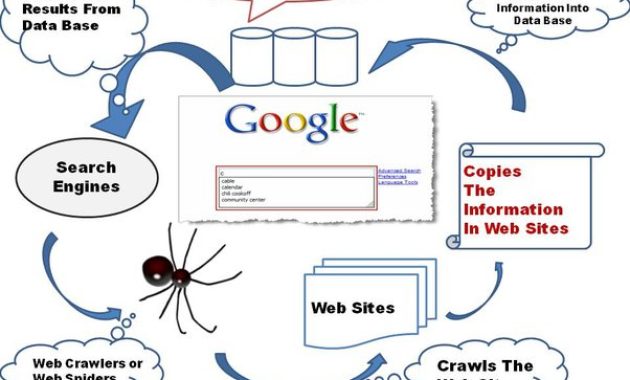A search engine is a software system designed to retrieve information from the internet or a database based on specific user queries or keywords. The primary function of a search engine is to crawl web pages, index them, and then provide relevant results to users based on their search queries.
Here’s a brief overview of how search engines work:
- Crawling: Search engines use automated programs called web crawlers or spiders to browse the web and discover web pages. These crawlers follow links from one page to another and collect information about the content of each page they visit.
- Indexing: Once a web page is crawled, its content is analyzed and indexed in a massive database. This indexing process involves extracting keywords, phrases, and other relevant information from the page to facilitate quick retrieval later.
- Ranking: When a user enters a search query, the search engine retrieves relevant pages from its index. The search engine’s algorithm then ranks these pages based on various factors like relevance, authority, and quality. Pages that are deemed most relevant to the query appear higher in the search results.
- Retrieval: Finally, the search engine presents the ranked list of search results to the user, typically in the form of a search engine results page (SERP). Users can then click on the links provided to access the desired information.
Popular search engines include Google, Bing, Yahoo, and DuckDuckGo, among others. They play a crucial role in helping users navigate the vast amount of information available on the internet by providing fast and relevant search results.
How search engine come into existence?
The concept of search engines has evolved over several decades, and their development can be traced back to the early days of the internet. Here’s a brief overview of how search engines came into existence:
- Pre-Internet Search Tools: Before the internet, various tools were developed to help users find information within closed systems like libraries or databases. These tools included card catalogs, indexes, and directories.
- Arpanet and Early Internet: In the 1960s and 1970s, the precursor to the internet, ARPANET, was developed. As the internet began to grow, the need for tools to organize and search its expanding content became evident.
- Archie, Gopher, and Veronica: In the early 1990s, several primitive search tools emerged to help users navigate the growing internet. Archie, developed in 1990, was one of the first search engines, focusing on indexing FTP archives. Gopher, released around the same time, allowed users to search for documents on the internet. Veronica indexed files on Gopher servers.
- The Birth of Web Search Engines: With the emergence of the World Wide Web in the early 1990s, the need for more sophisticated search engines became apparent. In 1993, the first web search engine, Wandex, was created. This was followed by JumpStation in 1993 and WebCrawler in 1994. However, it was the launch of Yahoo in 1994 and later Google in 1998 that revolutionized web search.
- Google’s Algorithm: Google’s founders, Larry Page and Sergey Brin, developed PageRank, a revolutionary algorithm that analyzed the relevance of web pages based on their incoming links. This algorithm significantly improved the quality of search results, making Google the dominant search engine.
- Expansion and Diversification: Over time, search engines expanded their capabilities, incorporating features like image search, video search, news search, and more. Companies like Microsoft (Bing) and Yahoo continued to compete with Google, albeit with varying degrees of success.
- Mobile and Voice Search: With the proliferation of smartphones and smart devices, search engines adapted to accommodate mobile and voice search, allowing users to access information on the go using their devices’ built-in assistants.
Overall, the evolution of search engines has been driven by advancements in technology, the growing complexity of the internet, and the increasing demand for efficient information retrieval tools.
Also Read : What is the role of AI in changing our Society
Whats the use of Search Engine?

Search engines serve several important purposes in today’s digital age:
- Information Retrieval: The primary function of search engines is to retrieve relevant information in response to user queries. Whether users are seeking answers to questions, looking for specific products or services, or researching various topics, search engines provide access to a vast array of information available on the internet.
- Navigation: Search engines help users navigate the vast expanse of the internet by organizing and categorizing information. Users can easily find websites, articles, videos, images, and other online resources by entering relevant keywords into a search engine.
- Research and Learning: Search engines facilitate research and learning by providing access to educational resources, scholarly articles, research papers, and authoritative sources of information. Students, academics, professionals, and anyone seeking to expand their knowledge can use search engines to discover valuable content on a wide range of topics.
- Shopping and E-commerce: Many search engines offer specialized features for shopping and e-commerce, allowing users to search for products, compare prices, read reviews, and make purchase decisions. E-commerce platforms often rely on search engine optimization (SEO) to improve their visibility in search results and attract potential customers.
- News and Current Events: Search engines provide up-to-date news coverage and information on current events from a variety of sources. Users can stay informed about local, national, and global news topics by accessing news articles, blog posts, and multimedia content through search engine results.
- Entertainment and Media: Search engines help users discover entertainment content such as movies, music, TV shows, games, and online videos. Users can find streaming platforms, entertainment news, reviews, trailers, and recommendations based on their interests and preferences.
- Local Services and Businesses: Search engines enable users to find local services, businesses, restaurants, attractions, and events in their area. Local search results often include maps, reviews, ratings, contact information, and directions, making it easier for users to locate and engage with nearby establishments.
Overall, search engines play a crucial role in connecting users with the information, resources, products, and services they need, thereby enhancing productivity, efficiency, and convenience in the digital realm.
What is Search Engine?
A search engine is a software system designed to retrieve information from the internet or a database based on specific user queries or keywords.
Whats the use of Search Engine?
Search engines serve several important purposes like Information Retrieval, Navigation and many more.






